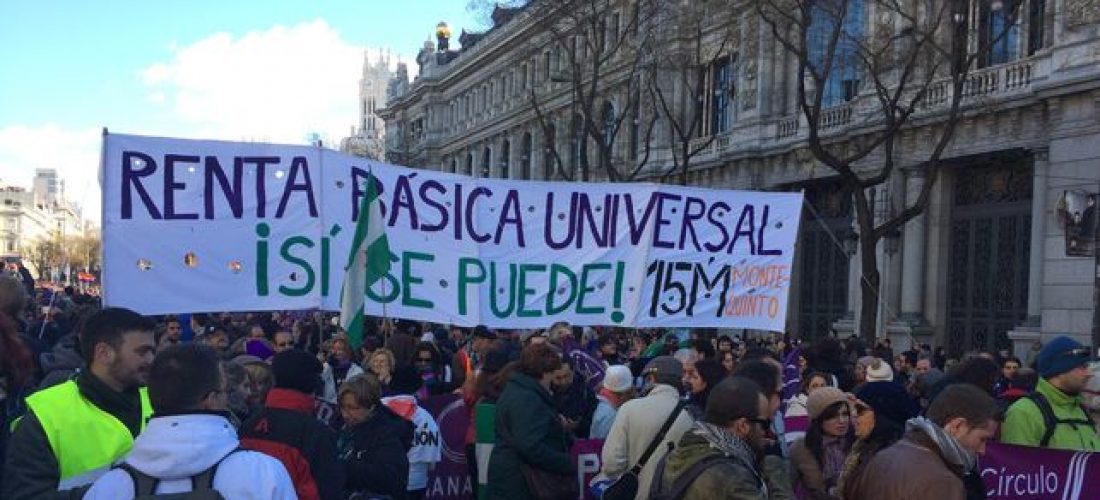The present situation of Europe is such that it can only lead to further social and political polarisation. Less than five years ago things were so different that it seems as if we were living in another world. Since 2008 the living conditions of the great majority of Europe’s population have declined so fast and so drastically, and the outlook is so disastrous that it doesn’t require a very sophisticated imagination to envisage more social convulsions.
The results of the recent Greek elections, which have to be repeated on 17 June; the French elections, ousting a very right-wing president and installing another whose message (very weak, to be sure) is opposition to the present supposedly anti-crisis measures; and the mobilisation in the streets of several cities of the Kingdom of Spain by the Occupy movement now generally known as 15-M (15May Movement) are three events in three spaces that are very different in political terms. What they have in common is that they are all mixed-bag expressions of the discontent of populations suffering the harshest consequences of economic and social policies that are preying on the non-affluent majority.
The economic situation of Spain is the most unstable it has been for years. The risk premium (29 May) is now hovering around the 511 mark, the highest since 1995. IBEX 35, the official index of the Spanish Continuous Market, closed on the week ending 25 May at 2003 levels; the National Institute of Statistics confirmed on 17 May that GDP had fallen 0.3% in the first quarter by comparison with the same period in 2011; the unemployment figure is close to six million officially unemployed, with 655,200 full-time jobs lost in the last twelve months; in the first quarter of this year 304,000 jobs were axed in comparison with 238,000 the previous quarter, representing an annual job loss of 8% and providing further evidence that the Spanish economy has gone into a tailspin; there are 1.73 million families all of whose working-age members are unemployed; the figure for the under-25s is over 50%; in 41% of families food spending has dropped; and some 25% of the population is now living in conditions of poverty, while 26% of Spain’s minors, some 2.2 million children, live in homes whose incomes are below the poverty line, this being the group that is perhaps hardest hit by the crisis. Meanwhile, the banking conglomerate Bankia needs a bailout to the tune of 23,500 million euros (almost 500 euros per inhabitant of Spain) and the population is unconvinced when the new president of the bank claims that the state-funded aid will be treated as an investment to make profit for the government and not as a loan.
Faced with this catastrophic situation, the Spanish government keeps applying more austerity measures (like cutting free school lunches for children who only have that one square meal every day). One of its latest announcements was that it was slashing the public services budget from 45% to 35% of GDP. Worse, we are told in language that recalls a cross between a pill-pushing mountebank and Richelieu at his slimiest that the “reform” will be “complicated and painful” as yet another attack is launched against the struggling population. Our neo-Pharisees again showed their true colours when they announced on 19 May that the government had given the green light to the draft Transparency Law but the royal family would be exempt, even while the royal son-in-law Iñaki Urdangarin is facing serious misappropriation, fraud and falsification charges that veer alarmingly close to the King himself (who recently fell several notches in the public esteem when an inconvenient fall and broken hip betrayed him as a philandering elephant killer who couldn’t resist a luxury hunting holiday in Botswana at a time when he was claiming that the plight of Spain’s young people was keeping him awake at night). It is no accident that the purple, yellow and red republican flag is increasingly prominent in recent demonstrations.
There are moments in history when events accelerate and take off. At first it is difficult to understand what’s happening because they don’t fit with the pronouncements and diagnoses of complacent mainstream journalists, fat-cat media pundits and incompetent academics. At such times, the victims see more clearly than anyone what’s happening, leaving the “experts” to scramble in their wake, more out of it than ever. While the Minister for the Economy Luis de Guindos tells us that the Banco de España is “a very prestigious institution that will soon recover its prestige” (sic), the victims of its soon-to-be-recovered “prestige” are calling for a Citizen Rescue Plan. The Spanish Occupy (15-M) movement appeared at just such a moment and, one year on, it’s stronger than ever, still indignant but learning and planning too. The clarity we should be getting from the government now comes from the movement and (unintentionally) from what the government response reveals about the state of the emperor’s wardrobe. The main points of the present situation are as follows:
1) The powers-that-be don’t like it. If, in the early days of 15-M, mainstream commentators peevishly dismissed the movement when they weren’t grossly slandering it today’s buffs, no longer disconcerted by the surprise factor, are redoubling their attacks. Since the worldwide protests on 12 May their articles are larded with phrases like “unfeasible”, “inefficient”, “lethargic”, “populist” but “lacking popular support”, “utopian” (naturally), “unrealistic”, “slowness in decision-making”, “disorganised” and so on. These commentators are more ill-intentioned than ill-informed since the movement is so well organised that it has a host of impressive web sites offering clear information about its goals and activities.
2) Repression and criminalisation of the movement are ever-greater. If the Catalan Minister for the Interior Felip Puig ordered the violent eviction of the occupation from the Plaça de Catalunya last year, the violence fell on the occupation of Madrid’s Puerta del Sol this year. Unsurprisingly, repression is the government’s ace up the sleeve when it imposes its cuts in hard-won social benefits. The detention of several union leaders on 29March was another example of how the rights of free expression and demonstration are being trampled on. Yet new announcements of measures criminalising protest (including a short-lived – because loudly condemned – website encouraging citizens to denounce protestors to the Catalan police) not only show the authoritarian drift of things but also that the powers-that-be are edgy about the fast-spreading and increasingly well-organised and articulate protest. This twofold trend has become more apparent in the last year.
3) The 15-M movement has been a timely reminder of the old lesson that if ideas, however good they are, don’t take root in powerful movements that reach a large number of individual citizens and groups they don’t have much future. One example of this is 15-M’s call for a guaranteed universal basic income. The movement has done more to promote this proposal than thousands of seminars, books, articles and lectures, which are necessary, of course, but not sufficient. In the case of Spain, much of this groundwork has been done but the idea has taken off quite spectacularly with 15-M. Even though it hasn’t yet achieved overwhelming mass-based support, basic income is much better known, understood and accepted now than it was a year ago.
4) The most important message of the movement is that it wants justice and opposes the barbarities being committed against the population in the name of the crisis and austerity: evictions galore, unemployment, salary cuts, sackings, attacks on public health and education, dire working conditions. This is expressed in the People’s Courts that have been organised, for example against Barcelona’s LaCaixa Bank at its “Towers of Mordor” headquarters last week. The contrast with the government’s rejection of a parliamentary Commission of Inquiry into the causes of the crisis has not gone unnoticed. Within the movement there are different opinions, different approaches over how to confront the barbarism but there is no doubt about who the enemy is. Two years ago, the prescient economist Michael Hudson wrote that, in order to govern, financial capital first had to bleed the economies dry and that the process will continue because what is happening today is an involution of the nineteenth- and twentieth-century struggles to replace the long tentacles of oligarchic private property and financial interests by progressive taxation policies and public enterprise. The 15-M movement, not exempt of well qualified graduates, understands this and has good knowledge of the mechanisms whereby the financial oligarchy manages to prevail over governments, in particular by evoking the needs of the “market” (a good example being the patently untrue January 2012 headline from Davos “De Guindos Gives Confidence to the Markets”).
5) One of the great pluses of the 15-M movement has been its skills in creating simple, punchy slogans to express its denunciations and programmes. The political ones include “I love you Democracy but you’re not here for me”; “Apolitical? Superpolitical!”; “Real Democracy, Now!”; and “Your vote’s valuable. Don’t throw it away”. Others take on the “austerity” measures: “They want us to tighten our belts and be caught with our pants down at the same time”; “This isn’t a crisis. This is daylight robbery!”; “Your banker, my crisis” and “This is austericide”. The rebellious mood is expressed with “If we can’t dream, we won’t let them sleep”; “System error. Reboot”; and “We’re not anti-system, the system is anti-us”. More than a hundred thousand teachers and students who marched in Barcelona on 22 May mainly opted for two crystal clear messages “Against the cuts in Education” and “Education is a right, not a privilege”. The corollary of this unambiguous, imaginative expression is a notable application of highly honed computer skills and thorough knowledge of the social networks. In general, perhaps largely through its slogans, 15-M has become a visible point of reference, an externalisation of people’s rage and anxiety, offering a sense to the downtrodden that they are not alone, a feeling of community, or cooperative effort. What fuels 15-M is much more than indignation even while it offers the only political space for the constructive channelling of public outrage into democratic debate, organisation and proposals. Public space is democratic space par excellence, a fact that has not escaped 15-M, and the more heavily armed police, helicopters and Black Marias there are, the more the citizens yearn for true democracy.
6) A very clear programme in the form of a Citizen Rescue Plan has now been adopted by many groups coming under the general umbrella of 15-M. At present, the web page informs the reader that these are “lines of action in constant construction” and that this is just a beginning. In well-argued pages, complete with pertinent articles, legal references and links to different groups, the Plan calls for (i) an end to bank rescues and a new ethical banking that responds to the needs of the population; (ii) free, universal, public and high-quality health and education; (iii) an end to job insecurity, recognition that wealth and well-being is based in the productive efforts of the majority and hence a more equitable distribution of wealth, including a universal basic income as a guarantee of the right to existence of every single citizen; (iv) an end to real-estate speculation and the right to decent housing, as established by Article 47 of the Spanish Constitution and offering a five-point plan as to how to achieve this; (v) transparency, accountability, civil rights, Internet rights and a truly democratic relationship between civil society and government.
7) Social and electoral realities are often very out of step. Apart from some of Spain’s historic nations, namely Catalonia, the Basque Autonomous Community and Galicia, there is no short-term electoral alternative in the country to the increasingly convergent right-wing PP and the “socialist” PSOE. The mismatch between the two realities is manifest in moments of conflict as in the general strike of 29March and the 15-M mobilisations and one can expect that it will be even more evident in the months to come. Hence some activists are now pondering the question of whether and how to give electoral expression to 15-M. This is one of the thornier problems the movement faces and naturally one that gives rise to reservations and suspicions. If social mobilisation usually does not have an immediate electoral expression, the idea of forcing debate in 15-M over presenting for the elections would not seem to be a good one. The great advantage the movement has is its ability to mobilise and organise a large number of people and to extend its influence to organisations and groups that don’t participate directly in its usual activities, not to mention its freedom to adapt to fast-changing circumstances and its ability to come up with a swift response. The latest surveys show that 15-M has the support of 68% of the population and 75% of young people.
Many opinions are swirling through Internet as to what the movement should do now. The main themes include representation, decision-making agility, diversification of activities, use of the media, planning of mass mobilisation and international coordination. Difficulties, problems and errors are welcome. The movement is alive and learning and bringing a breath of fresh air to the squares and streets of many cities. The reasons for 15-M’s protest and struggle are not going away but are appearing in more barefaced and more brutal forms. The social and political situation is increasingly extreme and the movement’s main challenge might now be how to link up and incorporate coherently the new forms of resistance arising with each new aggression. Whether the differences with other movements, unions, political organisations are great or small, it is time to pull together. The 15-M movement has shown the way: fac ut vivas. Its members are aware that if it is to last it will take large doses of responsibility, intelligence, imagination and, above all, hard work, qualities it has willingly embraced since they are mostly lacking among the perpetrators of our present distress. The task is attractive because 15-M, at least, sees another, much better world ahead of us.
Daniel Raventós is the author of Basic Income: The Material Conditions of Freedom. He is on the editorial board of the international political review Sin Permiso.
Julie Wark is the author of Manifiesto de derechos humanos (The Human Rights Manifesto – Ediciones Barataria, 2011) and is an advisory board member of the international political review Sin Permiso.







